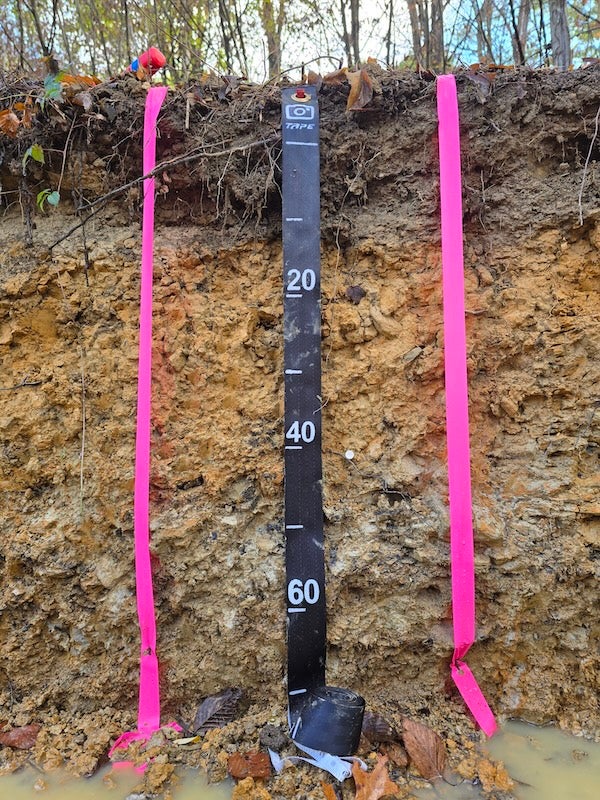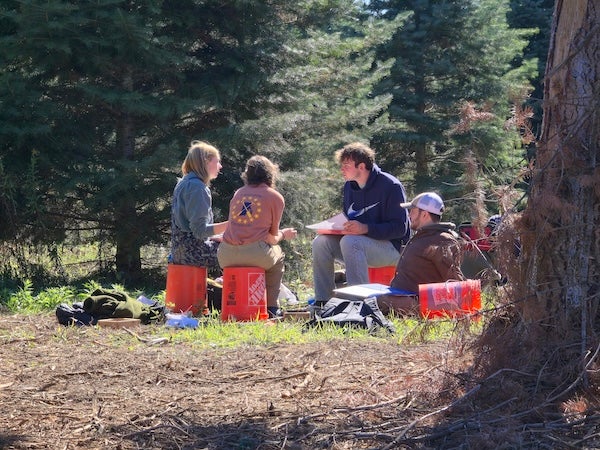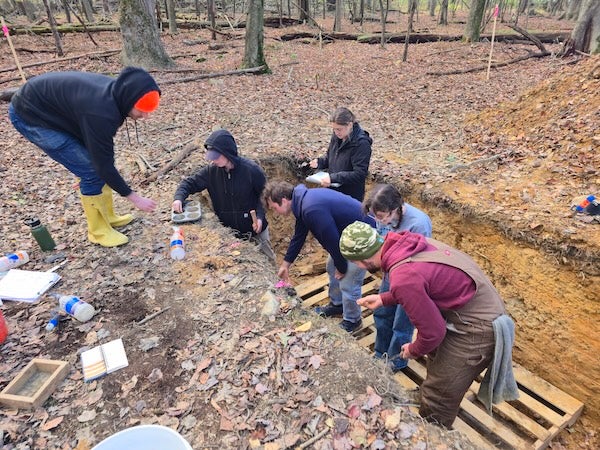“Essentially, all life depends upon the soil,” wrote Charles E. Kellogg, the third Chief of USDA’s Bureau of Chemistry and Soils, in the USDA Yearbook of Agriculture (1938). “There can be no life without soil and no soil without life.”
Members of URI’s Soil Judging Team are well aware that soil is much more than the dirt beneath our feet. The team recently earned second place in both the group and team categories at the Northeast Regional Soil Judging Competition at the University of Pittsburgh in Johnstown, Pennsylvania.
Soil judging is a long-standing academic tradition; a national competition has been held every year since 1961. This regional event brought a record twenty undergraduate teams from thirteen universities to apply their knowledge of soil science to compete for the Stanley Cup of soil judging.

Students climbed into five-foot deep pits to identify the soil layers (called horizons), described their properties, classified each soil according to the USDA soil taxonomy, and evaluated their potential uses. Participants worked in five soil pits—three individually and two in small groups—under strict time constraints. Scoring is based on three components: individual performance across three pits; group evaluations conducted collaboratively; and team scores, which combine the top individual scores from each pit with the best group score.
Despite being a smaller program compared to many of its competitors, URI has built a strong tradition of excellence in soil judging under the guidance of Professor Mark Stolt, who retired from URI’s Department of Natural Resources Science this past summer. This year’s competition marked the first season under the leadership of new coach and instructor, Joe Manetta ‘21 M.S. ‘23, who had previously co-coached alongside Stolt.
“I think the beauty of soil judging is it disguises incredibly rigorous field and classroom education as a fun competition for the students,” Manetta says. “I want to instill in my students a love of soil-environmental science and pedology; in-depth knowledge of how local geology, ecology, and geography all come together to form soil; and how we can interpret what this soil looks and feels like (its morphology) to evaluate its characteristics.”
Soil judging fosters a unique appreciation for soil science, Manetta adds, by teaching students to consider how topography, climate, parent material, biota, and time interact to form the soils they observe, and how those soils can be interpreted and understood. It also allows students to learn intensively in the field, applying their knowledge in unfamiliar settings while developing critical thinking and teamwork skills.
The URI team is now preparing to compete at the National Soil Judging Contest hosted by North Carolina State University in March 2026.

Soil is the Basis
For participants on URI’s team, the benefits of soil judging are vast. “We often see students begin the semester unsure about soil science,” Manetta says, “and leave with both a passion for the subject and a clear sense of its relevance. This is one of the most impactful educational experiences we can offer.”
Iris Freifeld, an environmental science and management major from Randolph, New Jersey, echoes Manetta’s enthusiasm. “It has helped me better understand subjects within my major because soils are greatly intertwined with other disciplines of environmental sciences,” she says. “I am able to apply my knowledge from soil judging within my other classes.”
“Soils are a major part of ecosystems, and understanding them can tell you a lot about the types of plants and wildlife that may inhabit an area,” adds Meghan Majewski, an environmental science and management major from Orangetown, New York. “Getting hands-on experience with soil judging has helped me better understand things that tie directly into what I’m studying and what I want to do in the future.”
A “Life-changing” Experience
Sean Cary, a sustainable agriculture and food systems major from Allentown, New Jersey, says that one of the most rewarding aspects of the recent competition was adapting to the vastly different soils found at each host school. “It’s a very cool experience to see the variation and uniqueness of soils outside of Rhode Island,” he says.
He plans to return next year for his third year of soil judging. “It is such a fun experience that you don’t feel like you’re learning, but at the end of the day you’ve learned way more than you thought you would,” he says. “It has been life changing for me.”
Ian Bento, an environmental science and management major from Richmond, Rhode Island, first became interested in soil judging through Dr. Stolt’s course in Soil Morphology and Mapping, where he first met Manetta. “Participating in soil judging was like taking an intense accelerated course,” he says. “I learned as much about soil morphology being in the field with [Manetta] as I did with regular URI soil courses. It took a lot of work but academically, it was well worth the effort.”
“Soil judging has helped build my understanding of soil tremendously,” adds Caleb Collins, an environmental science and management major from Hopkinton, Rhode Island. “I appreciate the interpretations section of the judging card–which essentially requires students to interpret the morphology (what we see and feel) to how the soil can be used–which helps me understand why certain soils allow for basements, septic tanks, and farming or not.”

Learning Along the Way
For Alyssa Rauscher, a marine affairs and environmental science and management double major from Fredericton, New Brunswick, Canada, the highlight of the competition was the collaborative group judging experience. “We went through the pits together, helping each other with challenging concepts and finding an answer as a team,” she says. “It was nice to know we were all learning together, and getting to apply our knowledge was rewarding!”
The strong sense of camaraderie among URI team members and the broader soil judging community was a highlight. “We had some long days in the field, but we always had fun,” adds Kimberly Kosteer, an environmental science and management major from Glocester, Rhode Island. “Everyone I met was incredibly kind. It’s a great community to be part of.”
As for URI students interested in getting involved with the team, Rauscher adds: “If you’re even slightly interested in soil or just like being outside and getting your hands dirty, I’d recommend this class. You learn everything along the way!”

